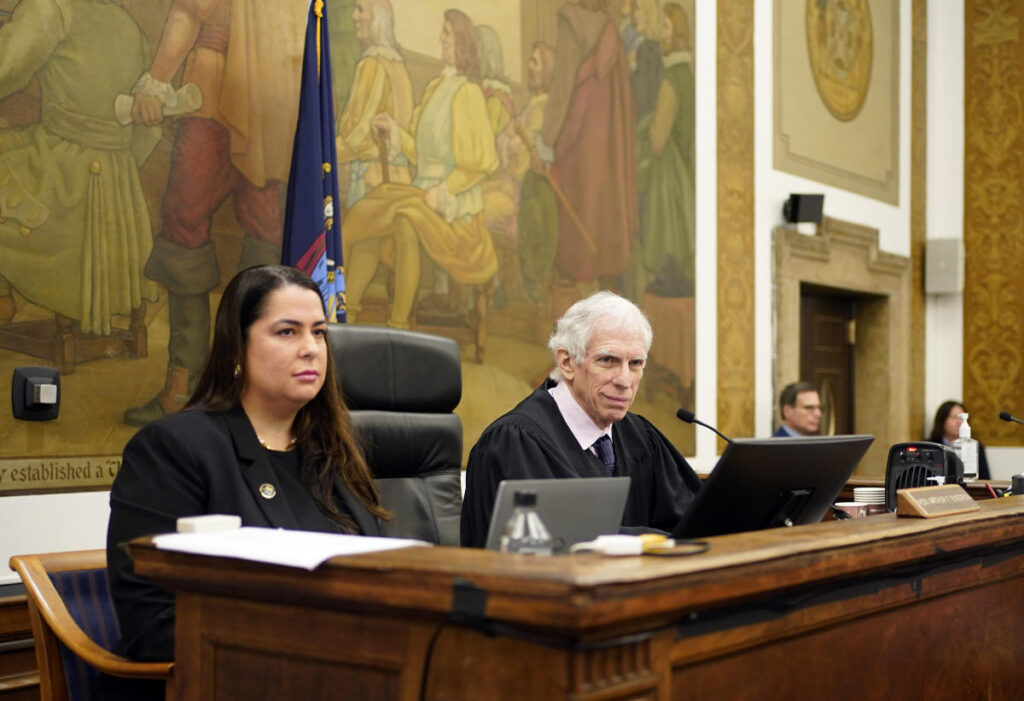Allison Greenfield, a former law clerk who came under fire from Donald Trump during his civil fraud trial, has been elected to a judgeship in New York City. At the age of 38, Greenfield is now one of six judges serving on Manhattan’s civil court, which primarily deals with small claims and other lower-stakes litigations. Her candidacy was unanimously endorsed by a local Democratic committee earlier in the year, which effectively eliminated the need for a primary contest, allowing her to run unopposed in the recent general election. This election marks a significant professional milestone for Greenfield, whose background and experience have equipped her for this judicial role.
During the civil fraud trial, Greenfield worked as a principal law clerk to Judge Arthur Engoron and found herself in the crosshairs of Trump’s criticism. The former president and his legal team repeatedly targeted Greenfield with derogatory comments, particularly in the midst of the proceedings. Trump’s criticisms were so pointed that they prompted Judge Engoron to impose a limited gag order aimed at preventing participants in the trial from disparaging court staff, including Greenfield. Trump’s violation of this order resulted in a monetary fine of $15,000, and the order was later expanded to include Trump’s lawyers after they expressed concerns about Greenfield’s influence in the court.
Trump’s attorneys accused Judge Engoron of allowing Greenfield to operate as a “de facto co-judge,” suggesting that her alleged political biases were skewing the proceedings against Trump. One of his lawyers, Christopher Kise, articulated a sense of dual opposition, claiming they were contending with both the case against Trump and Greenfield’s perceived partisanship. In response to these complaints, Judge Engoron defended the authority of Greenfield, asserting his right to consider her advice without restrictions. This exchange highlighted the tensions that can arise in high-profile legal battles involving powerful figures.
The situation became further complicated by allegations circulating on conservative media platforms regarding Greenfield’s political donations to Democratic causes, many of which were made during her previous bid for a judgeship in 2022. Faced with these allegations, Trump’s legal team filed a motion for a mistrial. However, Judge Engoron dismissed the request, emphasizing that there was insufficient grounds for such a drastic measure. This incident revealed how political narratives can intertwine with judicial processes, especially in cases involving prominent political figures like Trump.
Allison Greenfield’s journey to the bench illustrates a common trajectory within New York’s judicial system, where civil court judges often have the opportunity to ascend to the more prominent State Supreme Court. Judge Engoron himself began his judicial career in the civil court before being elevated to the State Supreme Court a decade later. Greenfield’s educational background includes a focus on economics and politics during her undergraduate studies at New York University, followed by her law degree from Cardozo School of Law in 2010. Her diverse experience, including her work for the city before joining Judge Engoron’s team, positions her well for her role as a judge.
In conclusion, Greenfield’s election as a New York City judge is significant not only for her personal career but also for the political and legal landscape in which she finds herself. Her previous experience as a law clerk during a highly publicized trial underscores the complexities and challenges that judges can face when their courts become arenas for political discourse. As she begins her judicial career, Greenfield will navigate the intricacies of the law while confronting the remnants of the controversies from her past experience in the courtroom, setting the stage for her future in New York’s judiciary.

